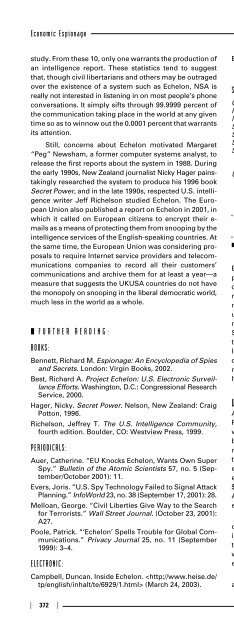ENCYCLOPEDIA OF Espionage, Intelligence, and Security Volume ...
ENCYCLOPEDIA OF Espionage, Intelligence, and Security Volume ...
ENCYCLOPEDIA OF Espionage, Intelligence, and Security Volume ...
You also want an ePaper? Increase the reach of your titles
YUMPU automatically turns print PDFs into web optimized ePapers that Google loves.
Economic <strong>Espionage</strong>study. From these 10, only one warrants the production ofan intelligence report. These statistics tend to suggestthat, though civil libertarians <strong>and</strong> others may be outragedover the existence of a system such as Echelon, NSA isreally not interested in listening in on most people’s phoneconversations. It simply sifts through 99.9999 percent ofthe communication taking place in the world at any giventime so as to winnow out the 0.0001 percent that warrantsits attention.Still, concerns about Echelon motivated Margaret“Peg” Newsham, a former computer systems analyst, torelease the first reports about the system in 1988. Duringthe early 1990s, New Zeal<strong>and</strong> journalist Nicky Hager painstakinglyresearched the system to produce his 1996 bookSecret Power, <strong>and</strong> in the late 1990s, respected U.S. intelligencewriter Jeff Richelson studied Echelon. The EuropeanUnion also published a report on Echelon in 2001, inwhich it called on European citizens to encrypt their e-mails as a means of protecting them from snooping by theintelligence services of the English-speaking countries. Atthe same time, the European Union was considering proposalsto require Internet service providers <strong>and</strong> telecommunicationscompanies to record all their customers’communications <strong>and</strong> archive them for at least a year—ameasure that suggests the UKUSA countries do not havethe monopoly on snooping in the liberal democratic world,much less in the world as a whole.❚ FURTHER READING:BOOKS:Bennett, Richard M. <strong>Espionage</strong>: An Encyclopedia of Spies<strong>and</strong> Secrets. London: Virgin Books, 2002.Best, Richard A. Project Echelon: U.S. Electronic SurveillanceEfforts. Washington, D.C.: Congressional ResearchService, 2000.Hager, Nicky. Secret Power. Nelson, New Zeal<strong>and</strong>: CraigPotton, 1996.Richelson, Jeffrey T. The U.S. <strong>Intelligence</strong> Community,fourth edition. Boulder, CO: Westview Press, 1999.PERIODICALS:Auer, Catherine. “EU Knocks Echelon, Wants Own SuperSpy.” Bulletin of the Atomic Scientists 57, no. 5 (September/October2001): 11.Evers, Joris. “U.S. Spy Technology Failed to Signal AttackPlanning.” InfoWorld 23, no. 38 (September 17, 2001): 28.Melloan, George. “Civil Liberties Give Way to the Searchfor Terrorists.” Wall Street Journal. (October 23, 2001):A27.Poole, Patrick. “‘Echelon’ Spells Trouble for Global Communications.”Privacy Journal 25, no. 11 (September1999): 3–4.ELECTRONIC:Campbell, Duncan. Inside Echelon. (March 24, 2003).Easton, Gary. British Broadcasting Corporation News. (March 24, 2003).SEE ALSOCOMINT (Communications <strong>Intelligence</strong>)Information WarfareNSA (United States National <strong>Security</strong> Agency)Satellites, Spy<strong>Security</strong> Clearance InvestigationsSIGINT (Signals <strong>Intelligence</strong>)Special Relationship: Technology Sharing Between the<strong>Intelligence</strong> Agencies of the United States <strong>and</strong> UnitedKingdomUnited Kingdom, <strong>Intelligence</strong> <strong>and</strong> <strong>Security</strong>❚ JUDSON KNIGHTEconomic <strong>Espionage</strong>Economic espionage, sometimes known as industrial espionage,is spying conducted for the benefit of a commercialor industrial enterprise, typically to gain informationnot available through open channels. (By contrast, economicintelligence conducted on behalf of governmentsusually draws on information available through open channels.)Technologically advanced nations such as the UnitedStates are most vulnerable to economic espionage, whichthreatens hundreds of billions of dollars in U.S. economiclosses to industry. In an attempt to curb industrial <strong>and</strong>commercial spying, Congress in 1996 passed the Economic<strong>Espionage</strong> Act, but challenges to U.S. companieshave continued.Vulnerabilities. According to a 1999 report delivered by theAmerican Society for Industrial <strong>Security</strong> (ASIS) to theFederal Bureau of Investigation (FBI), some $300 billionworth of U.S. intellectual property was directly threatenedby industrial espionage in 1997 alone. The ASIS notedmore than 270 individual cases of theft <strong>and</strong> attemptedtheft involving commercial information. In 2000, the ASISestimated that each year, losses <strong>and</strong> potential losses fromeconomic espionage cost American industry more than$60 billion each year. Of 1,300 companies surveyed by theASIS, fully 1,100 reported that they had been the targets ofeconomic espionage.Just as the most highly industrialized nations are theobvious potential victims of economic espionage, emergingindustrial powers <strong>and</strong> their economic firms are oftenthe most likely perpetrators. Such is the case with China,which figured in a number of news reports involvingeconomic espionage during the 1990s <strong>and</strong> early 2000s.In November, 2001, for instance, the FBI learned of anattempt by individuals operating a Chinese corporation to372 Encyclopedia of <strong>Espionage</strong>, <strong>Intelligence</strong>, <strong>and</strong> <strong>Security</strong>







![The Big Lie 9-11 and Government Complicity in Mass Murder [PDF]](https://img.yumpu.com/50957077/1/190x245/the-big-lie-9-11-and-government-complicity-in-mass-murder-pdf.jpg?quality=85)








